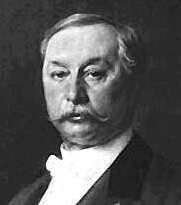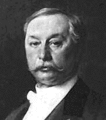Aleksey Lobanov-Rostovsky facts for kids
Prince Aleksey Borisovich Lobanov-Rostovsky (Russian: Князь Алексе́й Бори́сович Лоба́нов-Росто́вский) was an important Russian statesman. He was born on December 30, 1824, in Voronezh Governorate and passed away on August 30, 1896. He is best known for signing important agreements with China and the Ottoman Empire. He also published a significant book about Russian family histories.
Contents
Early Life and Career
Prince Lobanov-Rostovsky went to school at the Tsarskoye Selo Lyceum. When he was 20, he started working in diplomacy. This means he worked for his country to manage relationships with other countries. In 1859, he became a minister in Constantinople (now Istanbul).
After a short break from public service, he returned four years later. For ten years, he worked as an assistant to the minister of the interior. This role involved helping manage internal affairs within Russia.
Important Diplomatic Roles
After the Russo-Turkish War, 1877-1878 ended in 1878, Emperor Alexander II chose him as the ambassador to Constantinople. An ambassador is a high-ranking diplomat who represents their country in another. For over a year, he worked to bring peace back to the region.
In 1879, he became the ambassador to London, England. Then, in 1882, he moved to Vienna, Austria, as ambassador. In March 1895, under Emperor Nicholas II, he became Russia's minister of foreign affairs. This made him the main person in charge of Russia's relationships with other countries.
Russia's Influence in Europe
As foreign minister, Prince Lobanov-Rostovsky became more active in European politics. He especially focused on the Balkan Peninsula. This area includes countries like Serbia, Montenegro, and Bulgaria. Russia wanted to increase its influence there.
- Serbia received financial help from Russia.
- Russia sent many weapons to the prince of Montenegro.
- Prince Ferdinand of Bulgaria became friendly with the Russian emperor. His son, Boris, even joined the Eastern Orthodox Church.
- Russian diplomats tried to help the Bulgarian church and the main church in Constantinople get along.
- Bulgarians and Serbians tried to set aside their disagreements because Russia asked them to.
These actions made it seem like a group of Balkan countries might form against the Ottoman Empire. However, Prince Lobanov-Rostovsky mainly wanted Russia to be the most powerful country in the region. He did not want to start a new war. He believed the Ottoman Empire should stay independent as long as it didn't cause problems for Russia.
He also worked to weaken the Triple Alliance, which was a group of powerful European countries. He strengthened Russia's friendship with France, turning it into a formal military agreement.
Actions in East Asia
Prince Lobanov-Rostovsky was also very active in East Asia. He became a protector of China. He signed the Yamagata-Lobanov Agreement, which made Japan give up some of its gains in Northeast China. This helped Russia increase its influence in Manchuria. He strongly supported plans to increase Russia's power and wealth in that part of the world.
Prince Lobanov-Rostovsky was known for his strong character and ability to manage difficult situations. He died suddenly from heart disease on August 30, 1896, while traveling with the emperor. He had only been the director of Russian foreign policy for 18 months.
Personal Interests
Prince Lobanov-Rostovsky was a proud aristocrat. He was a descendant of the independent princes of Rostov. He was also a very cultured man with a deep knowledge of Russian history and genealogy. Genealogy is the study of family histories. He was considered an expert on the time of Tsar Paul I.
He had a large collection of coins. These included coins made by Russians when they occupied Königsberg from 1758 to 1761. His coin collection was later bought by the Russian Museum.
Images for kids
 | Charles R. Drew |
 | Benjamin Banneker |
 | Jane C. Wright |
 | Roger Arliner Young |



